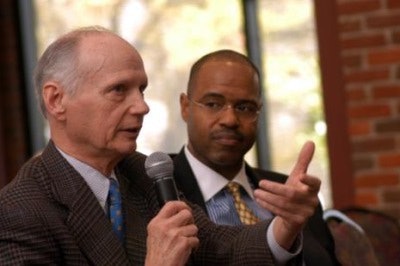 Former S.C. Governor Richard Riley and Juan Johnson, a Senior Distinguished Fellow in Diversity Leadership at the Riley Institute (photo courtesy of the Riley Institute)
Former S.C. Governor Richard Riley and Juan Johnson, a Senior Distinguished Fellow in Diversity Leadership at the Riley Institute (photo courtesy of the Riley Institute)When company officials and employees at corporate giant Duke Energy sought a meaningful response to the tragic June 17 shootings at Mother Emanuel A.M.E. Church in Charleston, they directed their attention to the Riley Institute at Furman University.
Two institute programs, the Diversity Leaders Initiative and the Emerging Public Leaders, will be expanded due to new support from Duke Energy and its employees. The Charlotte, N.C.-based company has donated $100,000 to support the expansion, and the employees have pledged to match the company grant. Duke Energy has roughly 4,000 employees in South Carolina.
For more than a decade, both programs have helped bring South Carolina leaders and civic-minded high school students together annually in respective cohorts to get them working toward greater racial unity and a heightened commitment to the public good, officials say.
“In the face of this tragedy, it is important to come together to help our fellow citizens persevere and move forward. I believe these programs will be an important step forward in doing just that,” Clark Gillespy, Duke Energy’s president in South Carolina, said in a statement.
“We will leverage what we think will make South Carolina a better state,” Dr. Don Gordon, executive director of the Riley Institute, told Diverse.
Gordon noted there has been “much to learn in the grace and forgiveness shown by the families of the victims and the Mother Emanuel community, [which] has had the incredible effect of pulling our state together rather than driving us apart.” The Riley Institute is focused on growing the long-term, statewide capacity to sustain a systemic understanding and appreciation of South Carolina’s diverse population, he added.
The Riley Institute, which is named after former S.C. governor Richard Riley, is developing an expansion of the Diversity Leaders Initiative (DLI), a program that convenes leaders from a wide range of sectors, including elected officials. The expanded program will specifically target educators and law enforcement officials to give them “the knowledge and insight to help them develop, communicate and implement an adaptive and collaborative on-the-ground culture that supports diverse communities,” according to the institute.
The institute will make an effort to recruit DLI alumni, such as county sheriffs, city police chiefs, and school superintendents, to participate in the new DLI.
Gordon explained that the DLI annually convenes roughly 160 local officials and community leaders in meetings over a five-month period. The DLI cohort typically reflects the state’s diversity with women making up half of the participants and African-Americans comprising 25 to 35 percent of the group.
“Duke Energy recognized how important [DLI has been] over the last dozen years … and they decided that, given the horrors of what happened in Charleston, the appropriate response was to push for systemic change in South Carolina,” Gordon said.
The Emerging Diversity Leaders (EDL) program, an expansion of the Emerging Public Leaders (EPL) initiative, will be a nine-month diversity-focused service leadership experience for rising high school seniors. The program will provide participants an intensive, week-long summer program on the Furman campus prior to the fall of their senior year.
“The EDL curriculum will teach participants how to lead in diverse settings, engage in the community, analyze critical issues, lead ethically, communicate and present effectively, and plan for the implementation of a diversity-focused community service project,” according to the institute.
Traditionally, the EPL brings 12 to 15 students to Furman each summer. Under the EDL, the student cohort will expand to at least 24 students, according to Gordon. Typically, Riley Institute staff has provided project support to students throughout the academic year, and DLI alumni have offered additional support to students.















